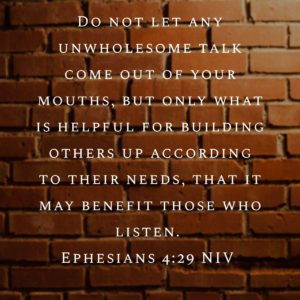President Lincoln came into office despised by half of his country. The North elected him, and the South quickly rejected him in exchange for their own president. He worked long and tirelessly to reunite a country that was tearing apart at the seams.
In the middle of his term, after one of the most infamous battles of the Civil War, he delivered the famous Gettysburg Address. Edward Everett, a renowned orator of his day, spoke before Lincoln. His speech was eloquent and two hours long. Contrast that with Lincoln’s 272 word address. Yet, Lincoln’s speech was the one that has been memorialized as one of the greatest speeches in our country’s history. It is memorized in classrooms across the United States. Using his words wisely, Lincoln spoke peace, meaning, and importance into a tragedy. He sought to unify and bring healing and equality for all United States citizens. His words were powerful.

The tongue is like a fire. Watch it closely!
Words have the power to heal or to destroy, to unite or to divide, to encourage or to tear down.
Likewise, the tongue is a small part of the body, but it makes great boasts. Consider what a great forest is set on fire by a small spark. James 3:5
Imagine if Lincoln had used his tongue to kindle hatred instead of peace. The thousands of angry and grieving listeners may have needed only a spark to light a forest fire of animosity and further division. Perhaps history may have progressed differently.
What we say matters.
As a camp counselor (many moons ago), I used a phrase to help remind campers to use their words kindly: “Milk and Bricks.”

Ephesians 4:29
It was a quick and fun reminder of Ephesians 4:29, which says, “Do not let any unwholesome talk come out of your mouths, but only what is helpful for building others up according to their needs, that it may benefit those who listen.”
What is the opposite of unwholesome? Milk!
What do you build with? Bricks!
Therefore, we could shorten the verse to a reminder: Milk and Bricks. We are to use our words for building up, not tearing down.
As we approach increasingly divisive times, let’s remember to use our tongues to put out flames, not spark a forest fire.
That’s all I have to say about that, so I’ll keep it short like Lincoln.
Pause: Find a quiet space, and read James 3: 1-12.
Renew: James warns that the same tongue can speak both good and evil. Examine your own speech. In what ways do you use your words for good? In what ways and in what situations do you find yourself using your words negatively?
Next: Look for opportunities to encourage and unify this week. Get creative! For example: write an unexpected thank you note, text someone telling them how much you appreciate them, or speak peace into a moment of conflict.
Let your speech always be gracious, seasoned with salt, so that you may know how you ought to answer each person. Colossians 4:6 ESV
Pause, Renew, Next!
